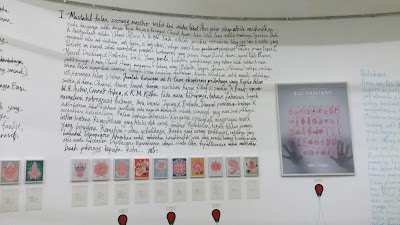Here is my insight for what I have been exposed for the first semester.
Financial system was created to be the middle man for demand and supply activities. The system helps producer to sell their product in exchange of compensation to the buyers. That is as simple as that, yet now financial system looks so complicated with lots of instrument, complex regulations with really huge player that so difficult to be intervened as well. Why those things occurred when the text-book meaning is so easy to understand?
Let us go back to earlier sentence which basically come to the fundamental concept for this system in word 'exchange of compensation'. This means financial system is all about the system to regulate the medium of exchange to be acceptable and fit all around the globe. But still the question is why it can be so complicated now?
First, it can be so complicated because the presence of interest in the money. When the amount of the medium of exchange itself can be grow by time, there will happen an unfair transactions for either the supply or demand side. It also create a transfer of risk in the transaction, with the debtor will burden all the risk in its settlement of debt plus perpetual completion of interest. This problem can be seen in the case European financial crisis with ECB try to 'help' Greece by giving a loan but what happen is Greece fall deeper in their bankruptcy since they fail to pay the interest in the loan. That is why, Islam really put a concern about this issue since it creates an unjust society and it also acts of a worship as a Muslim since it stated In Quran chapter Al-Baqarah verse 275"but Allah has permitted sale and forbidden interest".
Second, many instrument that appear in this system create financial deepening that really hard to be controlled. With the combination inter-related financial instruments and the nature of transfer of risk in the transaction, a financial decisions in the society sometimes do not affected the real economy. For example, IMF's Global Financial Stability Report noted "growing
recognition that dispersal of credit risk by banks to a broader and
more diverse group of investor, has helped make banking and overall
financial system more resilient". 15 months after this statement issued, Lehman Brothers was set to be bankrupt followed by the surprising financial crisis in 2008.
So how's the system actually should be?
Islamic finance offers some solutions which basically restructure all the things in the current financial market. However, it can be concluded that Islamic finance generally has two concepts which are the basis of its concept is from Quran and Sunnah, and it prohibits mainly four things; interest, uncertainty, gambling and prohibited matters. With these concepts, Islamic finance is said to offer a stable yet satisfying all the people in the system with the 'risk sharing' instruments.
First, it uses an equity contract with Mudharabah and Musharakah. This is a contract which rather than using interest to gain the profit, the capital provider will make the profit shared together. It is a very vital contract where Islamic economy is used to evolved with the performance of this contract. In the modern economy, this contract usually found in the investment sectors where the capital provider is willing to take a higher risks compare to risks that exposed in the saver sector likes banks.
Second, it uses an unilateral contract such as Zakat, Infaq, Waqf and Takaful. Unilateral contract is one of the most powerful contracts in Islamic economy. It was the basis of caliphate system where the fiscal policy is so strong and effectively distributed. Currently, the practice of this kind of contract is mostly to satisfy the religious needs of Muslims rather than become the fundamental point of economics stability. Even Takaful, the application out of its concept is still in minimal point which the practicability still copy-cat the Insurance company. However, Islamic finance definitely has a bright future on this particular sections where the volume of demand and supply on the circulation of the funds is always high.
Third, debt-based, lease-based, and some secondary contracts. This is the sections where Islamic finance player heavily penetrated where some people said 90% of Islamic banking product is based on these contracts.The reason is, it can easily mimicking the conventional banking of course. Yet, it is still the best choices since our economy is driven with banking activity.






